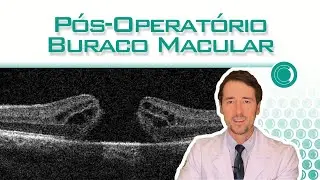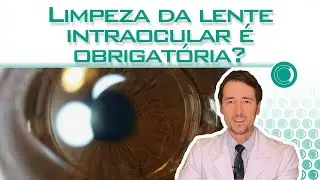What are the main reasons for low vision after cataract surgery?
What are the main reasons for low vision after cataract surgery?
What's up, everybody? This is Mário Bulla, ophthalmologist,
today I'm going to tell you what are the four main reasons for low vision after
main reasons for low vision after cataract surgery. Cataract
cataract surgery has evolved so much that, today, most patients are able
recover their vision very well and very quickly after surgery,
but unfortunately there are some cases where we can't recover our vision by operating on a cataract.
cataract. One thing that many people are afraid of when they have any
surgery are the complications after the surgery, fortunately the rate of serious
complications after cataract surgery is very low, one of the most feared
complications, endophthalmitis,
infection occurs inside the eye after cataract surgery, this infection is quite rare.
This infection is quite rare, usually occurring at a rate of less than one per cataract surgeries.
cataract surgeries.
And it happens a few days after the surgery the patient starts to have the eye
more red, more irritated, more sore, and the vision starts to get very poor, if this happens
this happens after cataract surgery, it is very important to tell your doctor immediately
your doctor immediately because this type of situation usually requires urgent
In some cases, besides the use of antibiotics, an antibiotic injection, a vitrectomy may be necessary to clean out the affected area.
vitrectomy to clean the inside of the eye. Other complications
that are also quite rare but are important to talk about are the displacement of
some fragment of the cataract into the vitreous cavity, if this fragment is very large, it will be necessary to
If this fragment is very large, it will be necessary to perform a vitrectomy to remove it.
and even more rarely, we can see the dislocation of the intraocular lens, that is, the lens that is placed in the vitreous
that is, the lens that is placed inside the eye to replace the lens may become displaced.
the lens may end up dislocating. If the patient has a good improvement in vision after
vision after the surgery and about 30 to 45 days after the surgery, the patient begins to have blurred
blurred vision, what is probably happening is cystoid macular edema. As the third
cause of low vision then I would like to talk about a cause that usually happens
months to years after cataract surgery, is posterior capsule opacification.
posterior capsule.
When we put the lens into the eye, we place it on top of the lens capsule, we preserve a film of the posterior capsule.
capsule, we preserve a film that surrounds the lens and this film where the lens
film on which the lens is supported often becomes dirty over time.
The posterior capsule opacity can be easily solved with an application of a yag laser.
of yag laser, it's a laser that we use to clean this capsule. And lastly then I
would like to talk about the main cause of low division after cataract surgery
cataract surgery that in reality has nothing to do with the surgery itself, but what happens is that
many patients already have some other disease in the eye and after cataract
cataract surgery, they cannot recover their vision because the other disease
that is getting in the way. In most cases that there is some disease of the retina
retinal disease such as age-related macular degeneration and diabetic retinopathy
diabetic retinopathy, also glaucoma when it is very advanced is a
cause of failure in the recovery of the patient's vision, so in these cases of previous disease
it is not that there was some problem in the surgery or that there is some complication
complication of the surgery,
by performing a good retinal exam and also by performing an oct, which is the
Optical Coherence Tomography, which will show how is the state of the macula and
of the optic nerve, in the case of very advanced cataracts where we can't see
the fundus of the eye, there is actually the possibility of being caught by surprise
by surprise, sometimes even by a large toxoplasmosis scar in the macula, but in some cases where the cataract
in some cases where the cataract is not so advanced, it may actually be
OCT before surgery, because some cases, like macular edema caused by diabetes, for
for example macular edema caused by diabetes or exudative macular degeneration
exudative macular degeneration require treatment that usually must be done before the
cataract so that the surgery can provide a good result, a good recovery of vision.
recovery of vision. Retina and
Vitreous Channel
This video and its comments do not replace medical consultation and are for educational purposes only, and should not be used for decision making, being necessary for this the consultation with the medical specialist.
Author:
Dr. Mário César Bulla
Cremers 28120
Ophthalmologist - Retina Specialist
www.clinicabulla.com.br
www.especialistaemretina.com.br
Instagram: @clinica_bulla
Video URL: • Cirurgia para Retinose Pigmentar - Te...
#retina
#ophthalmology
#vision































